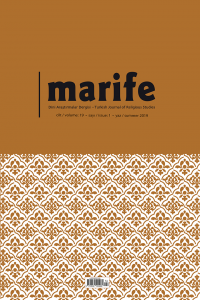
Marife Dini Araştırmalar Dergisi
Yazarlar: Mehmet KORKMAZ
Konular:Din Bilimi
DOI:10.33420/marife.795358
Anahtar Kelimeler:Religious Education,Religious Culture and Ethics Teachers,Special Education,Inclusive Education
Özet: In a general definition, the practices of special education mean to meet the needs of education for those who have individualistic differences and those who have special situations compared to their peers at school. The most common of types of special education existed at special education schools is the type of inclusive programs. In order to meet the educational needs of those who have special education, Turkey has currently some practices of full time inclusive, part time inclusive and some special education classrooms. While the inclusive education tries mostly to contribute to meet the needs of those who have special needs, at the same time it tries to include the normal students who do not have any insufficiencies, to take an active role in the development of their peers, to approach to their special situations emphatically, and to develop ability to live together in the society. But, there are many factors that affect the success of these applications. The efficiency of school’s physical and technological facilities, the approach of the school management to the matter, the number of special education and guidance teachers, the efficiencies of teachers of other subjects on special education, the quality of cooperation and communication between guidance teachers and teachers of other subjects and the approaches of students and their parents to the current situation, all of these and other factors have affected directly or indirectly the quality and success of inclusive/integrated education. Thus, this article deals with the problems encountered by religious culture and ethics teachers in inclusive education practices. In this context, some basic issues were discussed such as what kinds of problems they had experienced in the subject matter, whether they saw themselves as sufficient or not, whether they found the support of their stakeholders in relation to these applications. The aim of the research is to find out the problems faced by religious culture and ethics teachers in the process of inclusive education and to contribute to the suggestions for the solution of these problems. This study was done in Kayseri province in 2018 academic year. 128 teachers participated in the research. The study was a field research and it was conducted by descriptive survey model. SPSS-21.0 program was used to analyze the quantitative data of the research. Also the qualitative data were analyzed according to the descriptive analysis technique. Some important results of the research are as follows: More than 80 percent of the teachers participated in the research said that they had some problems about inclusive education. Those who participated in the research expressed that since the school where they worked did not have any special educational facilities, there were not enough guidance teachers in the schools and there were not special education teachers, they had limited facilities in terms of inclusive/integrated education. The teachers participated in the research claimed that school managers and school guidance services did not have any interest in solving all of these problems and the success of the inclusive education program at schools. They also claimed that their colleagues, students’ parents and their friends at school did not show enough interest in this matter. A great majority of the teachers participated in the research stated that they had some insufficiencies in terms of knowing special teaching methods and techniques. Again, it was understood that one of the most important problems they had was classroom management. In addition to this, they had some problems at effectively comminucating with those students, including them into educational activities, managing their classroom, providing integrity between normal students and inclusive/integrated program’s students. Thus, it was understood that the teachers had some insufficiencies in both preparing IEP (Individualized Education Program), and developing education materials about this matter. All of the teachers participated in the research had pedagogical formation. However, most of them did not take any kind of courses related to special education before start working as teachers. Again, an important portion of them such as 56 percent, did not take any courses or seminars regarding special education during the in service training. A great majority of the teachers participated in the research stated that the inclusive education practices are partially beneficial. However, there is a large group of teachers who find this practice useless. In this context, in order to reduce the problems mentioned in inclusive education, it is important to develop the opportunities to work together, and especially to improve the competence of the teachers of the religious culture and ethics course in inclusive education practices.